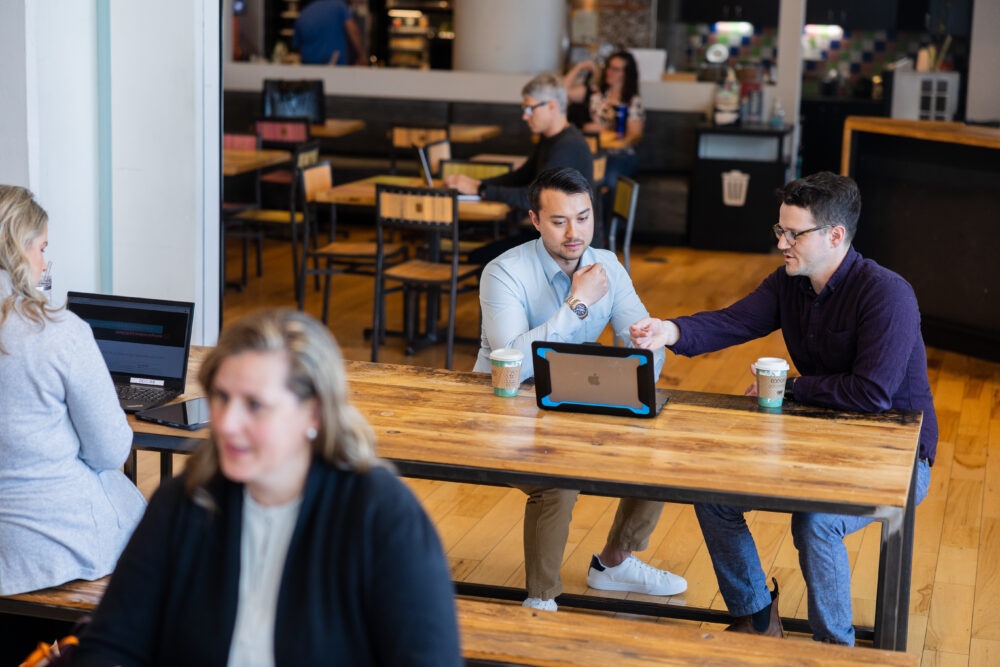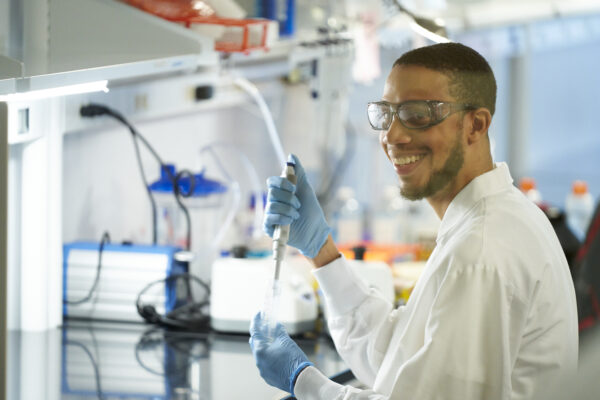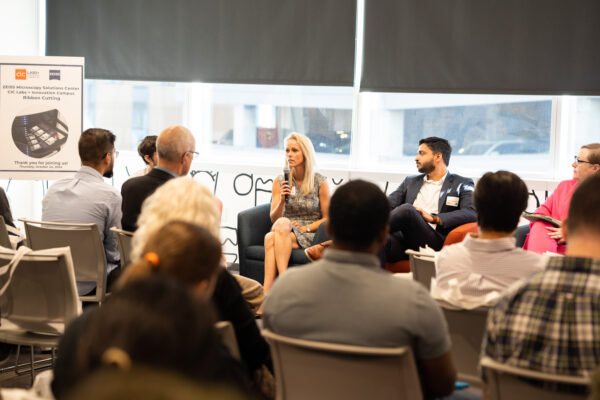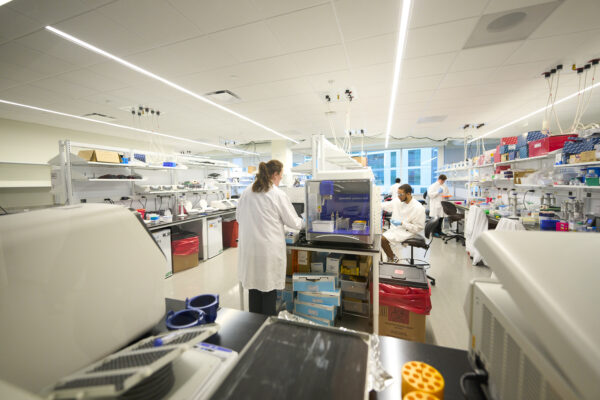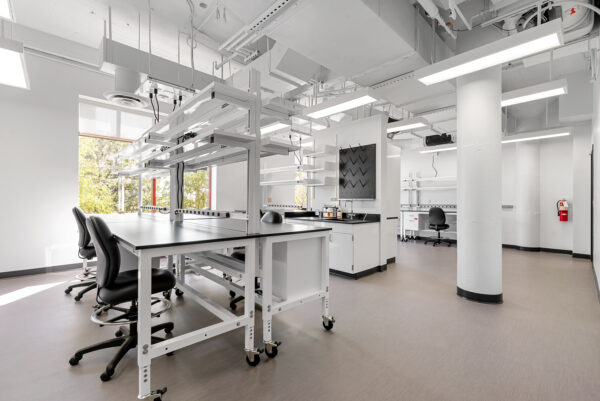One of the best places to start or grow a life sciences start-up in the country is nestled on the Mississippi River in Missouri.
St. Louis is a preeminent hub of biosciences and agriculture technology (agtech) activity with a growing innovation ecosystem ready to support startups, scale-ups, researchers and innovators. The city offers access to world-class talent, leading research centers and a vibrant community built on partnership, collaboration and fostering innovation.
CIC has been part of the St. Louis life science community for a decade. Our CIC Labs and Innovation Campus occupies three buildings in the Cortex Innovation District, one of the central locations driving the city’s inclusive economic growth.
We continue to invest in the future of St. Louis innovation, including an expanded sponsorship agreement with Thermo Fisher Scientific and our partner Cortex for $2 million in renovations that will bring state-of-the-art equipment, training and services to the more than 240 members developing solutions to life sciences challenges in our labs and shared workspaces.
Recently, CIC St. Louis hosted a webinar entitled “Fueling Innovation, Transforming the Local Life Science Landscape,” which convened leading life sciences innovation voices to explore some of the latest developments in the St. Louis life sciences ecosystem.
As John Land, GM of CIC St. Louis, said to kick off the webinar, “It is our hope that by the end of the program, you will share our collective optimism for the future of life sciences in the city.”
Meet the “Fueling Innovation, Transforming the Local Life Science Landscape” Panelists
Moderated by CIC’s Hope Foy, assistant director of programs and partners, our webinar panel included:
- Sam Fiorello, CEO and president at Cortex, a 200-acre hub of innovation and entrepreneurship
- Mark Lewis, Ph.D., vice president of finance and business operations at WUGEN
- Elliott Kellner, director of commercial innovation at Donald Danforth Plant Science Center, the world’s largest independent nonprofit plant research institute
The panelists each explained how their work contributes to the thriving life sciences innovation ecosystem in St. Louis. When discussing the impact of the Cortex Innovation District, Fiorello said, “Typically, folks measure innovation districts by physical space—a campus, a 200-acre district of all these buildings. The buildings are useless without the people inside of them doing great, innovative work.”
Expanding the strong life sciences talent base
Tens of thousands relocate to St. Louis each year, joining the city’s diverse and talented workforce of 1.5 million people. Organizations like Cortex, the Danforth Plant Science Center and CIC take pride in inclusive workforce development programs that nurture homegrown tech talent, particularly from traditionally underrepresented communities.
“We have a large focus on tech talent development, especially Black and brown tech people who are traditionally left out of tech jobs,” said Fiorello. “We spend a lot of time with the employer side to make sure the trainees have a place to land and build a fulfilling career. We also work in partnership on a training program for folks who aspire to start a company and become entrepreneurs.”
Intentional investment in education is as much a fixture in St. Louis as the Gateway Arch. The first public kindergarten in the United States opened in St. Louis more than 150 years ago, and the city continues to be at the forefront of academic pursuits. Kellner discussed the education and outreach work that extends to all levels.
“It’s not just about bringing kids on field trips out to the Danforth Center. It’s putting [experts] back in the schools so they can work alongside educators […] and, hopefully, light that spark early for students. We focus on K through 16, from all the way from elementary school to post-grad programs,” he shared.
Some of the world’s brightest minds are drawn to the area’s world-class universities, like Washington University in St. Louis, an international biomedical research leader that receives the second-highest amount of NIH funding.
Collaboration and partnerships drive innovation in St. Louis
Connections among institutions and the community drive meaningful life sciences innovation in St. Louis. For example, WUGEN was founded on groundbreaking technology developed at Washington University in St. Louis and has since licensed a second treatment. The clinical-stage biotechnology company continues developing these innovative cellular therapeutics to treat cancer.
“St. Louis has a strong academic and investor base with expertise in pharma and agtech spaces […] Being able to tap into top-tier resources really makes for an attractive development space for entrepreneurs,” said Lewis.
The connected network of incubators, flexible shared lab and workspace, and a growing footprint of private lab and office space allow companies to grow roots and scale in St. Louis. Utilizing shared lab space offered by CIC St. Louis or incubators enables researchers and early-stage companies to deploy resources more strategically and efficiently, freeing up money, time and focus on world-changing innovation.
Collaboration and partnerships are not just among academic institutions and startups. Kellner explained that the Danforth Center’s unique position as an independent research institute allows it to connect the more than 280 full-time research scientists it employs with external partners, including strategic for-profit corporations. Many major agriculture players headquartered in St. Louis include Bayer Crop Science, Bunge, Post Holdings, Anheuser-Busch, Nestlé Purina, and Rabo AgriFinance.
“None of this has been haphazard or accidental. It’s the intentional investment of time, people and resources that has happened over the last 20 or 30 years in this community. We are now reaping those awards collectively,” Kellner added.
Learn more about St. Louis as a life sciences innovation hub
Watch the full on-demand webinar here for more in-depth insights from our expert panel, including:
- Exciting trends in life sciences and agtech in St. Louis including neuroscience, genomics, oncology, geospatial science and agriculture
- The resources and relationships that support founders looking to grow and scale businesses at the forefront of life sciences technology
- How organizations like Cortex, Danforth Center and others collaborate to create an intentional, inclusive innovation destination
